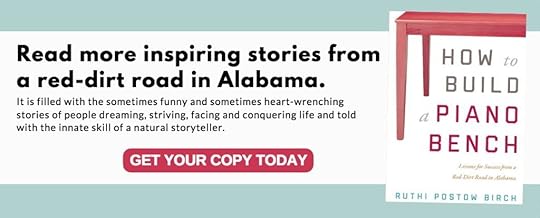Ruthi Postow Birch's Blog, page 13
June 19, 2018
Ruth Bader Ginsberg, SeaBiscuit, and Me
What do I have in common with RBG and Seabiscuit? Nobody let us in the game.
We had to work just to get in. Even then, we weren’t expected to win, and we all ached to win.
Ruth Bader Ginsberg
It should have been a snap for a woman as brilliant and driven as RBG to get into any game she wanted. But even a law degree from Columbia University didn’t open doors to the big law firms for a woman, so RBG forged her own path. She stood up and spoke up for fairness and equal pay for other women. She got in the game and won. In 1993 she took her seat on the Supreme Court.
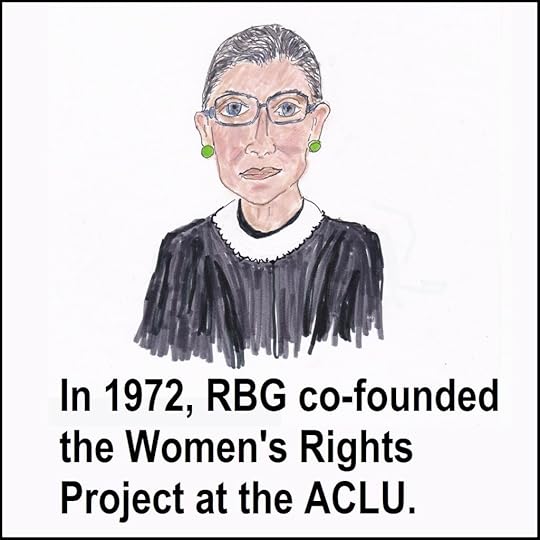
In 1972, while RBG was making great strides, I was just getting started in the job market, and I was learning it wasn’t fair and the pay wasn’t equal.
“Get your education and amount to something,” I’d been told. So I got my education, but no job offers. When I applied for a job, the first, and usually only, question any employer asked me was,
“How fast do you type.”
I’d say, “I can’t type,” and the interview would be over.
Finally, I met an employer who didn’t care if I could type. I got an interview with the manager of an office supple business looking for a manager trainee. He offered me the job on the spot.
At last, I had a job and the salary was more than I’d dreamed of – $135.00 a week (a good salary in 1972).
I just had to go to the human resources department to fill out the employment forms and I’d start Monday.
But the HR manager had other ideas.
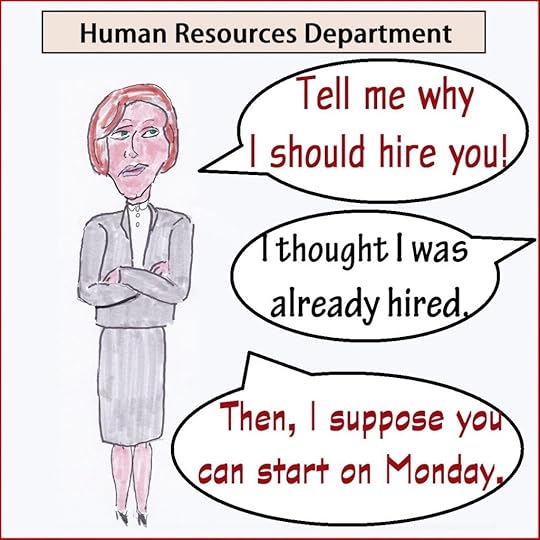
She begrudgingly admitted I had the job, but she had one last bombshell.
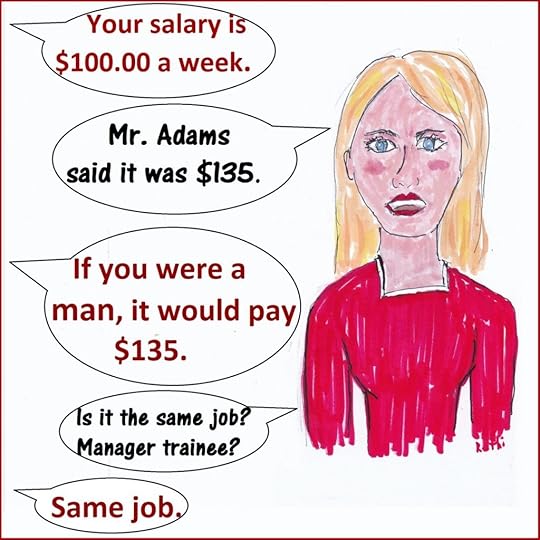
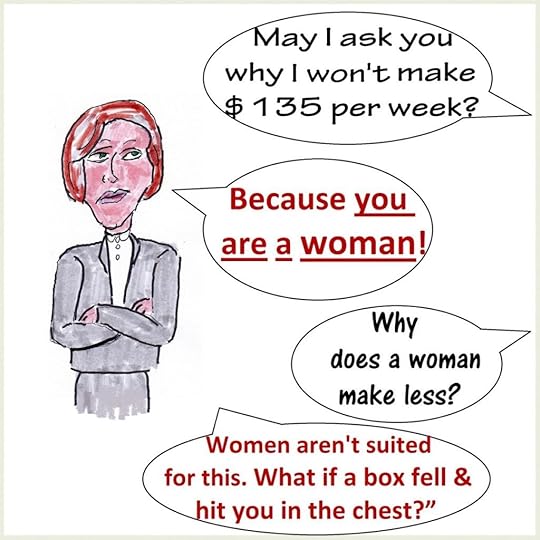
Didn’t men have anything just as vulnerable as my chest?
I did not start that Monday as a manager trainee.
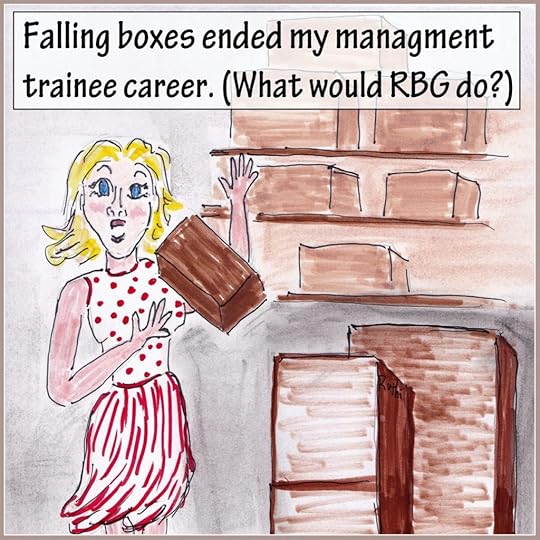
I was still determined to find a career in business which meant I had to overcome two facts I couldn’t change.
I was still a woman.
I still couldn’t type.
I needed help.

They couldn’t get me a job, but they gave me an idea – I could work there.
I looked around the agency. They were all women. Some were interviewing. Others were talking on the phone. I could do that!
The next day, I started my new job at the agency, and it was a great job! I got to talk to dozens of different people every day. I got to call employers, interview job seekers, and learn about all kinds of people.
Best of all, I got to work on commission! That meant the sky was the limit.
It was exhilarating. I was in the game!
But I wasn’t.
Why?
Because there was another division in the company, the “professional division,” that was made up of men, and the men were expected to win. Not only win, but produce (and earn) seven times what the “girls” in the clerical division did. “We can’t compete with the men,” I was told. So, it was predetermined that every man in the company was more valuable than I, and should make more money.
You’re not in the game if you can’t win. So, I wasn’t in the game. But I ached to win –
Which brings me to Seabiscuit.

Seabiscuit was a movie about a horse who also ached to win, but he was forced to be a training partner, forced to lose to other horses.
I didn’t see the movie until years after I’d forced my way into the game. But even then, it brought back all the feelings I’d had. I felt Seabiscuit’s desperation as he strained to win. I felt his hopelessness! I sat in the theater, and cried till my shirt was wet and my face was a clown mask with mascara-painted triangles and a red nose.

Seabiscuit had been forced to lose to make the other horses feel better about themselves.
When he was finally untethered, he didn’t just race. He won!
Did women have to lose to make men feel better about themselves?
Which brings me back to Me
I decided nobody could keep me out of the game! Business is a contest and winning is the only measure in a contest. To produce as much as a man, I’d have to fill 7.7 times as many jobs as he did. They’d have laughed if they knew I planned to compete with them, so I wouldn’t tell them. I had a plan.
I’d sneak in!
It was simple. All I had to do was work longer and harder, make more sales calls, know my clients better, and fill more jobs that a man.
It took two years for me to out-produce the #1 man. The company executives found out they were wrong.
A woman had gotten into the men’s game, and won it.
The post Ruth Bader Ginsberg, SeaBiscuit, and Me appeared first on How To Build A Piano Bench.
May 30, 2018
My First Job – Frazzle, Fizzle, Flop
I was sixteen when I got my first job. It was working Saturdays in a grocery store. (I say I got it, but I didn’t actually get it or even have to interview. My mother got it for me because she knew the store manager.)
I discovered one problem right away – standing up all day was hard.
After an hour my new shoes, that were really adorable, killed!
Lesson learned! You couldn’t wear cute shoes and be a cashier.
I pointed out the problem to the manager, but he didn’t resolve it.

My first two days I mainly filled out forms and watched other people work.
The job didn’t seem so hard, I thought.
Punch in the prices, take the money, (This was when everybody paid for their groceries in cash.) and give back the change. Simple!
Then customers started coming. And no! Not simple! Not easy!
First of all, the cash register was a tyrant. You hit one wrong key, and the whole price is wrong! And you couldn’t just go back and erase.

Cash register keys weren’t my only problem. Handling money was definitely one!
Another lesson – money is dirty
And I was touching it all day, counting out dollars, quarters, dimes, and pennies, so many pennies. Where did stores get the idea that all the best prices ended in 79 cents?

And people could get nasty about their change.
My next problem – vegetables – no price tags!
Why not? I was supposed to remember the prices for a pound of beans, or carrots, or cauliflower?
No. I had to look up the price for every vegetable, every time, even if I’d just rung it for the customer before.
The growing line of customers put me under such pressure.
How could I hit the right keys under so much stress!
It was bad enough when I knew the name of the vegetable. But then a woman brought up this thing I’d never seen. I fumbled through the list, looking for – I didn’t know what.

She finally told me it was a parsnip.
At first, the customers were patient when I told them it was my first day. As the day went on, and the line got longer, they started getting irritable.
When the line reached half-way to the meat counter, they started getting hostile.
Then I made one little mistake that really set them off.
I’d finished ringing up a shopping cart filled to the brim with groceries when the customer found a mistake on the bill. I had to put everything back and start over. It got ugly.
By midafternoon, something was clear to the manager and to me.
I was not cut out for the high-pressure work of cashiering!
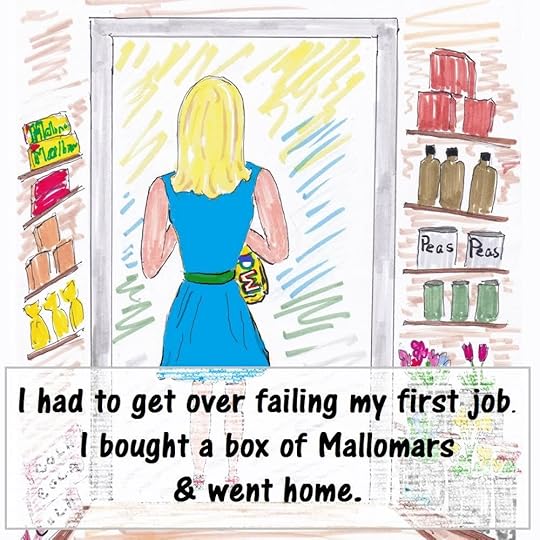
My next assault on the business world
I was spending a pleasant day shopping. I went into the Fairhope five & dime.

On impulse, I decided it was the perfect day to apply for a job, because my hair did right and I looked really cute.
I found Mr. Walker, the store owner, and told him I wanted a job. He gave me an application – my first – and told me to fill it out. It didn’t take long because I only had the one job to write about – my three Saturdays in the grocery store.
When Mr. Walker looked at the application, he frowned and looked up at me.
“This was your only job?”
I answered, “Uh-huh.”
“Is this right? You were there only three days?”
“Uh-huh.”
“Why did you stop?”
I explained.
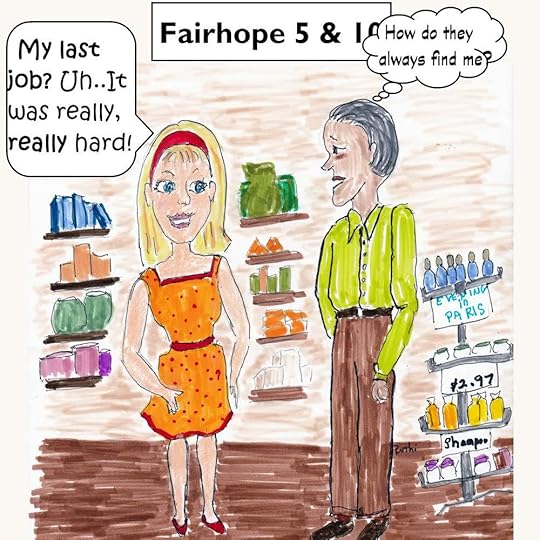
”It was awful. When you don’t hit all the right buttons on the cash register, you have to start over. And it takes a lot of time when you have to do a whole cart full of groceries over. And I was supposed to remember the prices for beans, and carrots, and parsnips, all at the same time. It was hard to remember anything when the line of customers was getting longer and longer. And I didn’t even know what a parsnip was.”
I gave him my brightest smile. “But I’ll be better at this job because you don’t sell vegetables.”
I didn’t even get past the front door, that is, I failed the interview.
I went home fighting off the fear of failure and wishing I had some Mallomars.
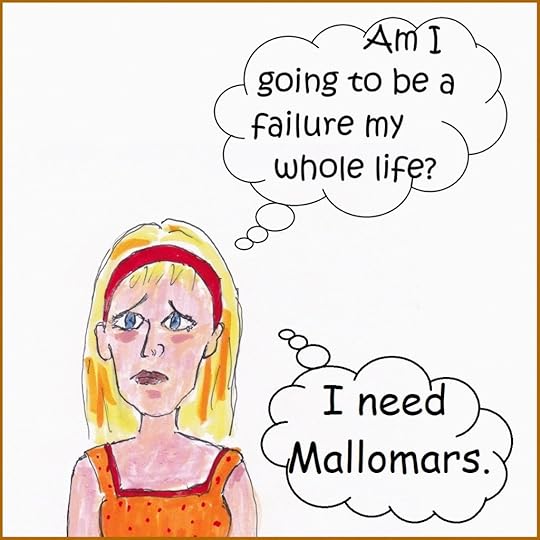
They were hard experiences. But after giving it thought, I realized they taught me three valuable lessons and helped me narrow down my career choices.
When you’re on an interview, you don’t need to express all of your feelings.
You shouldn’t use the fact that you failed on one job as the reason you would succeed on another.
My path to success lay in a career that didn’t require the ability to memorize the price of parsnips.
(And they complain about millennials!)
The post My First Job – Frazzle, Fizzle, Flop appeared first on How To Build A Piano Bench.
May 15, 2018
A Sobbing Woman and a Naked Engineer Walk into HR
It had been a strangely calm week in the human resources department.
There had be no crises to handle or fires to put out. So, Ms. HR came into the office humming, enjoying the beautiful morning, and anticipating another calm day.

No. Calm never lasts long in the human resources department.
Today it didn’t last long enough for her to finish her first cup of coffee. She opened her email and found that the dam had broken and a flood of problems were gushing forth.
Somebody had eaten the bookkeeper’s lunch.
The office was both too hot and too cold.
She needed to counsel the receptionist on professional dress.
A knock on her open door made her look up and into the angry faces of two women! “We were walking down the hall when Jake stopped us and made lewd comments. We tried to get past him, but he grabbed me. There were other people there. They saw him and told him to leave us alone. You need to do something about him!”
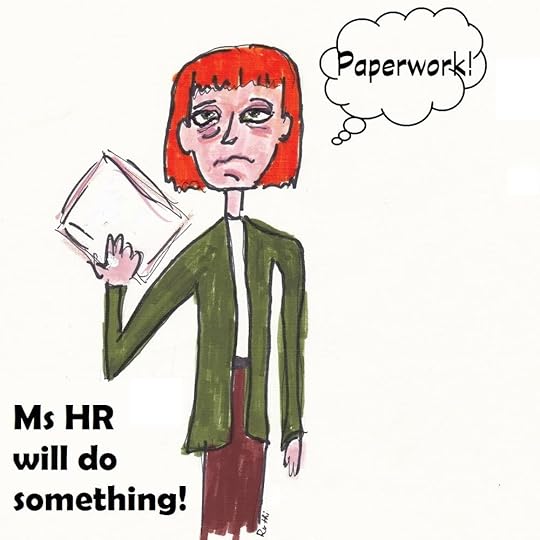
Ms. HR could have guessed which man did it even if they hadn't told her – Jake! He was already on probation for comments he made to the accountant.

She called security to escort Jake to her office – after he was dressed. Once there, she went over the company’s zero-tolerance policy and put his termination letter in front of him.
“Jake, when I put you on probation, I told you that there would not be another chance. Another incident would be cause for immediate termination. Now you’ve harassed two more women.”
Jake looked shocked.

I just told you.
It never happened!I'm certain it did happen – with two different women and there were witnesses.
I don’t feel like you believe me.No, I don’t. Besides that, I just found you in your office, naked!
I was not! I had on my boxers.That’s naked enough. We’re finished here.
I don’t think you're on my side!Tom will escort you to your locker and out of the building.
You know what? I don’t feel welcomed here!

Tom took Jake’s arm to escort him out, but Jake turned back.
Wait! Will there be any severance?With Jake gone, she started on the paperwork, but was interrupted again. This time it was Paula, the new assistant to the Executive Vice President, who stood at her door – sobbing, wet-faced, make-up running.

Bill again! His third assistant this year!
Ms. HR sighed and handed the woman a box of tissues, recalling, wistfully, that there had been one whole week without a need for tissues.
“Paula, you're not fired. I'll find another position for you. (And another, hopefully thicker-skinned, assistant for Bill.)
But first, a job for Paula. She had some ideas.
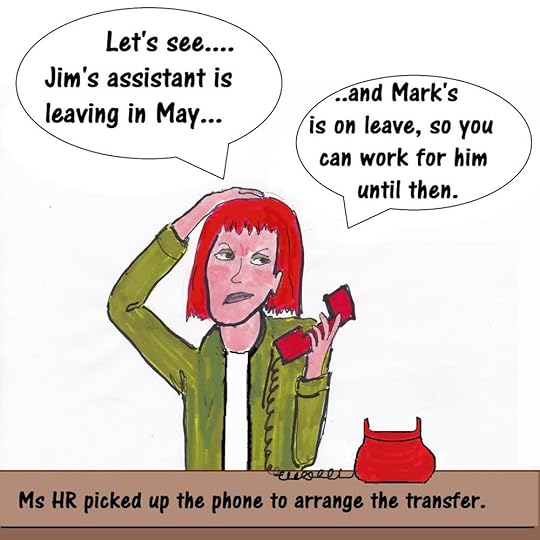
Paula gasped. No!

“Why can't you. They’re both very nice bosses.”
“I know. But I can't work with them.”
“Why not?”
“I just can't.”
“That’s silly. Tell me why.”

Finally alone in her office,
Ms. HR started laughing. She kept laughing all night. The paperwork would be a nightmare, but what other job would give her such great stories!

The post A Sobbing Woman and a Naked Engineer Walk into HR appeared first on How To Build A Piano Bench.
April 27, 2018
Lorraine, The Cat
A Story From A Third Grader’s Diary
Grandma’s friends don’t use first names
They call each other Mrs.
Mrs. Gates, Mrs. Webb, Mrs. Farley –
All except for Lorraine
even though she’s grown too
With kids and her own house.
When the women talk about Lorraine,
they whisper
(they think that I don’t hear)
about how she’s “raising those children”
or where she got the money for her house
or how she dresses.
I heard Grandma call her a cat
She does look kind of like a cat –
A playful yellow cat
With her sparkly green eyes
and her hair tied up in a purple scarf –
like a tail.
They said she’s showy.
She’s a show all right — like a movie dancer.
When she walks down the street
in her sundress belted tight at the waist
her full skirt bounces and swings
like a band is playing.
Sometimes Lorraine has parties,
that go till way past my bedtime
her house all bright with lights
and loud with laughing people
who don’t live on Petain Street
and
Sometimes she’s married.
The post Lorraine, The Cat appeared first on How To Build A Piano Bench.
April 4, 2018
It took Pride and Grit for Mama to Bring the Union to Chickasaw
 Some Saturdays, I’d go to her store and watch her work in the cashier booth. I could see the pride Mama had in her work. She showed that she knew everything she did was vital to the success of the store. When she balanced the cash drawers and prepared reports, they were accurate to the penny. When her day was done, she left secure that she’d left things in such shape that the store could open tomorrow.
Some Saturdays, I’d go to her store and watch her work in the cashier booth. I could see the pride Mama had in her work. She showed that she knew everything she did was vital to the success of the store. When she balanced the cash drawers and prepared reports, they were accurate to the penny. When her day was done, she left secure that she’d left things in such shape that the store could open tomorrow.
A proud woman shows respect for other people.
Mama’s pride also showed in how she treated others – with respect. Her job was valuable to her store, therefore every client she served was valuable. She dealt with the car mechanic or waitress who brought weekly payroll checks to cash with the pride of an investment banker handling a million dollar investment for the store’s most important client.
Pride is the opposite of shame.
We didn’t have much money, and Mama’s only really nice clothes were hand-me-downs from my wealthy aunt. You might think a proud woman wouldn’t accept help from other people. Actually, that’s exactly what a truly proud person would do, because pride is the opposite of shame. Mama was proud, not ashamed, of who she was and what she had. She knew she managed the best she could. “Besides,” she said. “it doesn’t hurt you to let the other person feel proud too. Don’t ask for anything, but if someone wants to give you something, take it. It will mean more to them than it does to you.”
“Have pride about yourself!”
Mama took pride in how she looked, whether she was dressed in her green, checked nylon work uniform or in her best dress for church.
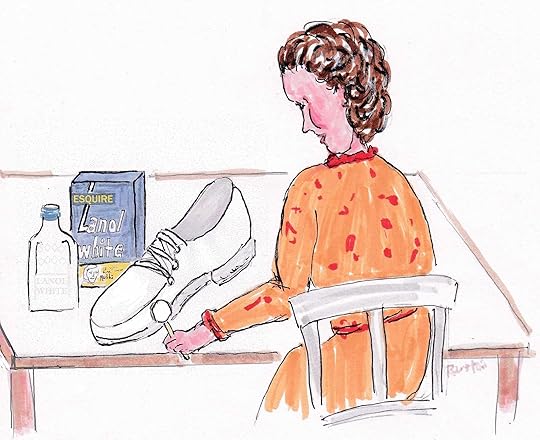 Saturday nights were for polishing her white work shoes and I still smell the Esquire Lanol-White Shoe Polish. “Your shoes are the first and last things people will notice about you. Never go out of the house with shoes that are scuffed and run down at the heel.”
Saturday nights were for polishing her white work shoes and I still smell the Esquire Lanol-White Shoe Polish. “Your shoes are the first and last things people will notice about you. Never go out of the house with shoes that are scuffed and run down at the heel.”
One Sunday night when I was nine, I managed to go from playing in the yard to get in the car for church without Mama seeing me. When I sat down beside her, she saw my dirt-streaked arms and legs, and her eyes shot sparks. She squeezed my arm in a hand that was a vise-grip, rubbed at the brown streaks with her handkerchief, and pulled me to her to whisper, “How could you come to church this way? Show that you have some pride about yourself!”
It took pride and grit for Mama to bring the union to Chickasaw.
Mama read in the newspaper about trade unions that worked to get better wages for their members and decided the retail clerks in south Alabama, deserved a union. Members of a proud profession deserve to be compensated fairly, and she had the courage to do something about it. She went to work, along with other workers in her grocery store. They met, planned, organized, went on a picket line, and she won her union. Mama never made more than 1.62 per hour, but she was proud to have earned that because she worked to get it.
I went with Mama to the monthly union meetings at the Merchant Marine Hall in Mobile. She spoke up on issues such as right-to-work, minimum wage laws, and health benefits. I didn’t understand the issues, but I felt proud that my Mama spoke and other people listened to what she had to say.
When Mama died, people I hadn’t seen in years came to the funeral – even people who didn’t like anybody came to show how much they loved Mama. She lived her life with pride and made a difference – in business, in her church, and in every life she touched. Mama was really somebody to be proud of!
Do you have a story to share about a proud woman in your life?
The post It took Pride and Grit for Mama to Bring the Union to Chickasaw appeared first on How To Build A Piano Bench.
March 27, 2018
MY WORST FEARS DROVE ME TO REACH MY GOALS
Fear of failure can be a powerful motivator. It was for me. Failure had a face that I could see, touch, and feel. It was real, and it made a real difference in what I was willing to do to succeed.
I grew up in a paper mill town, on a red dirt road that became a metaphor for failure. From as far back as I can remember, I lived with one goal, set by my parents – to get far away from that road and be a success. It was their chant and their sermon. “You’re gonna get off Petain Street, get an education, and amount to something. You’re going to be somebody!”
There was failure and there was success – no gray areas, and failure was not acceptable for me. “Other children have excuses. You don’t have excuses.”
It was clear. Failure meant Petain Street, with its shot-gun houses that sat on plots of dry earth, as grassless as graves. It meant a rutted road of red clay, that dried to spew dust into the air to choke me and dye my clothes red-orange.
I went to college, leaving behind Petain Street, with its beer joints, truck stops, and check-cashing stores. I started a career and had success, but no matter how far away I got, if I looked back over my shoulder, it was there, chasing me, threatening to bring me back. Now it had the brown, worn-as-shoe-leather face of an old woman, a face that ached with age, though she couldn’t have been 40.
I ran harder and faster, and to get farther away, to be finally safe. But when I looked again, Petain Street was still there, this time with the faces of my old playmates, now women, living their lives still on Petain Street with no more to look forward to than baby showers, prayer meetings on Wednesdays, choir practice on Thursdays, and church services twice every Sunday. That wasn’t my dream of success.
Just as my fears had a face, my dreams had a face. It was different, a laughing face, filled with wonder and curiosity, that spurred me to action. Petain Street drove me away from failure and onward to build a life with options and promises of ever-new goals to excite me.
So, which was the stronger motivator – the face of fear or that of dreams?
Along the way, I hit some rough stretches when I needed motivation to get through. Two years after I’d invested everything I owned to build my business, I was in one of those times. I’d lost some large business deals and didn’t have new prospects. I was tired and didn’t think I had the energy or desire to get back up and go again. Dreams weren’t enough. That night, Petain Street came back to me in a dream, actually a poem of a dream.

In my dream,
I’m sitting at a truck stop counter, smiling,
swinging my leg as a come-on to men
who know how to rotate tires on 18 wheelers,
tighten brakes, and pull carburetors,
their wrenches crusty with grease.
I hear a waitress laugh, and look up
to see her cigarette bobbing between sugar-pink lips.
She smiles and leans over the counter
where two truck drivers eat ham and eggs.
Suddenly, the truck stop is gone
Now I’m sitting at a linoleum-topped table, sticky with hot sauce and old grease.
I’m in the Three Pig’s Bar B Q
on the corner where Craft Highway meets Petain Street.
The room is tinted yellow with light from the jukebox
A Jax Beer clock hangs over a door
that has a picture of a winking pig in a cowgirl skirt.
Two good ol’ boys lean on the bar, grinning at me.
They’re tanking up before they head home
to see about their wives.
Finally, tossing, fretful, I start to awaken, but I’m afraid. I pat my bed to test it, to be certain I’m home, before I open my eyes, relieved that morning had come and returned me to my life. I sit up, ready to take on whatever comes.
What motivates you?
How do you keep the face that drives you vivid?
The post MY WORST FEARS DROVE ME TO REACH MY GOALS appeared first on How To Build A Piano Bench.
How Your Worst Fears Can Be The Force That Drives You To Reach Your Goals
Fear of failure can be a powerful motivator. It was for me. Failure had a face that I could see, touch, and feel. It was real, and it made a real difference in what I was willing to do to succeed.
I grew up in a paper mill town, on a red dirt road that became a metaphor for failure. From as far back as I can remember, I lived with one goal, set by my parents – to get far away from that road and be a success. It was their chant and their sermon. “You’re gonna get off Petain Street, get an education, and amount to something. You’re going to be somebody!”
There was failure and there was success – no gray areas, and failure was not acceptable for me. “Other children have excuses. You don’t have excuses.”
It was clear. Failure meant Petain Street, with its shot-gun houses that sat on plots of dry earth, as grassless as graves. It meant a rutted road of red clay, that dried to spew dust into the air to choke me and dye my clothes red-orange.
I went to college, leaving behind Petain Street, with its beer joints, truck stops, and check-cashing stores. I started a career and had success, but no matter how far away I got, if I looked back over my shoulder, it was there, chasing me, threatening to bring me back. Now it had the brown, worn-as-shoe-leather face of an old woman, a face that ached with age, though she couldn’t have been 40.
I ran harder and faster, and to get farther away, to be finally safe. But when I looked again, Petain Street was still there, this time with the faces of my old playmates, now women, living their lives still on Petain Street with no more to look forward to than baby showers, prayer meetings on Wednesdays, choir practice on Thursdays, and church services twice every Sunday. That wasn’t my dream of success.
Just as my fears had a face, my dreams had a face. It was different, a laughing face, filled with wonder and curiosity, that spurred me to action. Petain Street drove me away from failure and onward to build a life with options and promises of ever-new goals to excite me.
So, which was the stronger motivator – the face of fear or that of dreams?
Along the way, I hit some rough stretches when I needed motivation to get through. Two years after I’d invested everything I owned to build my business, I was in one of those times. I’d lost some large business deals and didn’t have new prospects. I was tired and didn’t think I had the energy or desire to get back up and go again. Dreams weren’t enough. That night, Petain Street came back to me in a dream, actually a poem of a dream.

In my dream,
I’m sitting at a truck stop counter, smiling,
swinging my leg as a come-on to men
who know how to rotate tires on 18 wheelers,
tighten brakes, and pull carburetors,
their wrenches crusty with grease.
I hear a waitress laugh, and look up
to see her cigarette bobbing between sugar-pink lips.
She smiles and leans over the counter
where two truck drivers eat ham and eggs.
Suddenly, the truck stop is gone
Now I’m sitting at a linoleum-topped table, sticky with hot sauce and old grease.
I’m in the Three Pig’s Bar B Q
on the corner where Craft Highway meets Petain Street.
The room is tinted yellow with light from the jukebox
A Jax Beer clock hangs over a door
that has a picture of a winking pig in a cowgirl skirt.
Two good ol’ boys lean on the bar, grinning at me.
They’re tanking up before they head home
to see about their wives.
Finally, tossing, fretful, I start to awaken, but I’m afraid. I pat my bed to test it, to be certain I’m home, before I open my eyes, relieved that morning had come and returned me to my life. I sit up, ready to take on whatever comes.
What motivates you?
How do you keep the face that drives you vivid?
The post How Your Worst Fears Can Be The Force That Drives You To Reach Your Goals appeared first on How To Build A Piano Bench.
February 20, 2018
HOW MAL LEARNED TO COOK ARTICHOKES
THE WOMAN WHO WOULDN’T GIVE IN OR BACK DOWN.
No problem! I once knew a woman who lived her life by those words, and the life she had was magnificent. Mal Johnson was a journalist and civil rights activist who befriended me when I was just getting started and struggling to find the right direction for my career. We met when my husband, also a journalist, surprised me by inviting her to dinner. At the end of the evening, Mal invited us to visit Washington and stay with her at her condo in the Watergate.
She was the most exciting person I’d ever met. She was also the most inspiring, as she told her stories of the battles she’d won. If Mal could do all of the things she did, I could too. If she had the courage to face any obstacle and say, “No problem,” so could I.
When she was young, her husband was in the military and they were sent from the East coast, where Mal had a teaching position, to a base in California where there was a glut of teachers and she couldn’t get a job. She told her husband, it was no problem. She would find a different job.
He said, “But you don’t know how to do anything.”
She picked up the job ads. “Don’t worry about it,” she told him, “I’ll find a job. Here, look at this one.” It was an ad for a chef at a private estate. “I can do that.”
“What are you talking about? You can’t boil water!”
“Don’t you worry about it. I’ll learn.”
Mal talked her way into the job. It was for an heiress who was accustomed to fine food. No problem. Mal invested in a gourmet cookbook and started her job.
She stashed the cookbook in the servant’s powder room off the kitchen. When she was told what was wanted for dinner, Mal slipped into the powder room, wrote the recipes on three-by-five cards, and returned to the kitchen. Then, one the day the lady brought in a bag of things Mal had never seen before. “Mal, I have a guest coming for dinner tonight. This is his favorite. I know you have the menu planned, but please cook these as well.”
Mal looked at the things. She had no idea what they were. No problem; she would figure it out how to cook these ugly green things that didn’t even look edible as soon as she found out what they were.
She telephoned her husband at the base, described the things, and asked him to go to the base library and look through books until he could find something that looked like them. “You’re going to get caught now for sure,” he said.
“Don’t worry about it. Just find it and tell me what it is.”
He called half an hour later. “I think I have it. It’s an artichoke. Mal, you’ve never heard of these things. This is the end!”
“No, it’s not. I’ll do it. It’ll be fine. Don’t worry.”
It was better than fine. Mal served the dish to the artichoke connoisseur, who announced that they were the finest he’d ever eaten, and asked for her recipe.
“I’m so happy you like them, and I’d love to give you the recipe, but I can’t. You see, it was my grandmother’s recipe, and she made me promise I’d never let it out of the family. But I’ll cook them for you anytime.”
During my time with Mal, she told story after story about her victories over life’s circumstances. One of my favorite stories is about how she learned to drive a car. Mal’s husband died young, leaving her with little money, but a new car that friends told her to sell. She needed the money, and she had never learned to drive.
Mal wouldn’t hear of it. “I looked at that brand new automobile sitting out front, and I made up my mind I would learn to drive it, and I’d learn it by myself. I went out and bought a book.” I stopped her and said I didn’t even know there was a book on how to drive. “Of course there is. There’s a book on how to do anything you want to learn.”
“I learned to drive at four o’clock in the morning. I studied my book until I was pretty sure I knew what to do. Then I set my clock for four a.m. and went out driving. I kept it up until I was good enough to take my test.”
Mal went on, from teacher and chef, to become a journalist, travel the world as the United States’ first black female White House Correspondent, accompany Richard Nixon on a trip to China, and be inducted into the Journalists Hall of Fame. She was 76 years old when she started her own media consulting firm. The last time I saw her, a few months before she died, at 83 she was busy planning for the next women’s summit.
Mal proved the power of a no-problem attitude. It says, “Don’t present reasons why I can’t, because I’m going to.” With that, you can go wherever you want to go.
I love words, learning them, experimenting with them, and listening to how other people use them. A few weeks ago I shared some words (Really? Wow! You’re kidding!) that have made my life more interesting because people have fantastic stories to tell, and these responses encourage them to keep telling them to me. You can win people every day if you know the magic words.
These two little words have muscles. They can end hostilities, defuse conflicts, relieve stress, help in navigating all kinds of relationships, and lead to success.
THE TWO MOST POWERFUL WORDS FOR SUCCESS IN LIFE – AND BUSINESS ARE “NO PROBLEM.”
The post HOW MAL LEARNED TO COOK ARTICHOKES appeared first on How To Build A Piano Bench.
February 5, 2018
“It’s Not Fair!” Children Learn About Prejudice The Hard Way
The lessons children learn in school aren’t all from arithmetic or geography lessons, but a lot comes from the messages we get from teachers and other children. Some of those lessons hurt – and those often have more impact and last longer than the others.
When I was five, I started first grade. I remember my first day. I woke up early, excited, and was ready to go an hour early—new dress, new shoes, new socks, and a new box of Crayolas!
We had just moved from Alabama to Texas, so I didn’t know any of the other children, and I stood back, a little timid. Then my teacher, Mrs. Thompson, opened the door. I thought she was beautiful and kind. As we filed in, she smiled and said something nice to every student. Except me. When my turn came, she didn’t smile. Actually, she made an ugly face and I could tell she didn’t like me. I’d never before met anyone who didn’t like me, but now, I was meeting one of the most important people in my life, and she didn’t.
I was confused. I didn’t understand why my teacher didn’t like me or why she treated me differently, so I thought there had to be something wrong with me.
Much later, I learned that she hadn’t wanted me in her class because I was only five when the school year started. She thought I was too young. I didn’t turn six until mid-September. The school had made an exception to accept me, and she was angry about it.
I was learning about prejudice before I ever heard the word.
Before she even met me, Mrs. Thompson had already made her decision about me. She had made up her mind that I did not belong in her class.
The second day, I learned that I wasn’t as smart as most of the other children.
Mrs. Thompson divided us into four groups based on how smart we were. I’d thought I was as smart as the other children. I had been in kindergarten, but she put me in the lowest group. All the other groups got workbooks
I was embarrassed to be in the “worst” group, even though Inez, who became my best friend, was in that group too, and she was smart. She even knew two languages, and she taught me words in Spanish.
The better-group children sat in a circle in the front of the room.
When the better-group children did good work Mrs. Thompson hung it on the wall. I worked hard because I wanted to show Mrs. Thompson I was smart, and I wanted to make her like me and put one of my assignments on the wall too.
The worst day of my life, up until then –
Mrs. Thompson gave the whole class pictures of Little Red Riding Hood to color. It was my chance to show her I what a good job I could do. I was good at coloring. I was half finished when I heard her say to color the cape “bright” red. I thought “bright” meant “light”, and my heart sank. I’d messed up again. My cape was shiny, dark red. I tried to fix it by scraping off the red crayon with my fingernails. Mrs. Thompson saw it, snatched it up, slammed it back down in disgust, and snapped at me. “I said bright! Don’t you ever listen? This is just a mess!”
I kept my eyes down on my paper. My face was hot. I knew all the children heard her and were looking at me.
I wanted to shout, “But I did listen!” But I was too embarrassed to tell her I didn’t know what “bright” meant. When I went home, I was ashamed to talk to my parents about it. These were new feelings. I more than felt sad. I felt angry-sad. It felt like waves of red-hot tears started in my chest, swelled up through my throat, like a scream, and pushed at my eyes. “It wasn’t fair!” “It wasn’t fair!”
In the middle of the year, Mrs. Thompson quit, and we had a new teacher. She taught me different lessons. She did away with the groups except for reading, and Inez and I were in the higher group for that. The new teacher smiled at me and put my work on the wall too. So I learned that I was as smart and as worthy as the other children, and I deserved a place! I learned the difference between being judged and being accepted.
Mrs. Thompson lessons were valuable. She taught me about prejudice, discrimination, and unfairness.
Today I’m glad I learned Mrs. Thompson’s lessons. Because of her, I understand what prejudice feels like and the damage it does. I couldn’t stand up against her, but she taught me the things I would stand against, because I know how much it hurts to be judged without being given a chance, to be falsely accused, or to be treated unfairly.
I hate the expression, “Life’s not fair.” It implies that unfairness is okay because it’s just the way things are. No! Life’s not as fair as it can be, and we need to recognize the unfairness and work, every day, to and make life better.
What lessons have you learned “the hard way”?
What have those lessons taught you about standing up for your values?
The post “It’s Not Fair!” Children Learn About Prejudice The Hard Way appeared first on How To Build A Piano Bench.
January 29, 2018
THE TWO MOST POWERFUL WORDS FOR SUCCESS IN LIFE – AND BUSINESS
I love words, learning them, experimenting with them, and listening to how other people use them. A few weeks ago I shared some words (Really? Wow! You’re kidding!) that have made my life more interesting because people have fantastic stories to tell, and these responses encourage them to keep telling them to me. You can win people every day if you know the magic words.
Words have power, and two of the most powerful are “No problem.”
These two little words have muscles. They can end hostilities, defuse conflicts, relieve stress, help in navigating all kinds of relationships, and lead to success.
A no-problem approach to life doesn’t give in or back down.
I once knew a woman who lived her life by those words, and the life she had was magnificent. Mal Johnson was a journalist and civil rights activist who befriended me when I was just getting started and struggling to find the right direction for my career. We met when my husband, also a journalist, surprised me by inviting her to dinner. At the end of the evening, Mal invited us to visit Washington and stay with her at her condo in the Watergate.
She was the most exciting person I’d ever met. She was also the most inspiring, as she told her stories of the battles she’d won. If Mal could do all of the things she did, I could too. If she had the courage to face any obstacle and say, “No problem,” so could I.
When she was young, her husband was in the military and they were sent from the East coast, where Mal had a teaching position, to a base in California where there was a glut of teachers and she couldn’t get a job. She told her husband, it was no problem. She would find a different job.
He said, “But you don’t know how to do anything.”
She picked up the job ads. “Don’t worry about it,” she told him, “I’ll find a job. Here, look at this one.” It was an ad for a chef at a private estate. “I can do that.”
“What are you talking about? You can’t boil water!”
“Don’t you worry about it. I’ll learn.”
Mal talked her way into the job. It was for an heiress who was accustomed to fine food. No problem. Mal invested in a gourmet cookbook and started her job.
She stashed the cookbook in the servant’s powder room off the kitchen. When she was told what was wanted for dinner, Mal slipped into the powder room, wrote the recipes on three-by-five cards, and returned to the kitchen. Then, one the day the lady brought in a bag of things Mal had never seen before. “Mal, I have a guest coming for dinner tonight. This is his favorite. I know you have the menu planned, but please cook these as well.”
Mal looked at the things. She had no idea what they were. No problem; she would figure it out how to cook these ugly green things that didn’t even look edible as soon as she found out what they were.
She telephoned her husband at the base, described the things, and asked him to go to the base library and look through books until he could find something that looked like them. “You’re going to get caught now for sure,” he said.
“Don’t worry about it. Just find it and tell me what it is.”
He called half an hour later. “I think I have it. It’s an artichoke. Mal, you’ve never heard of these things. This is the end!”
“No, it’s not. I’ll do it. It’ll be fine. Don’t worry.”
It was better than fine. Mal served the dish to the artichoke connoisseur, who announced that they were the finest he’d ever eaten, and asked for her recipe.
“I’m so happy you like them, and I’d love to give you the recipe, but I can’t. You see, it was my grandmother’s recipe, and she made me promise I’d never let it out of the family. But I’ll cook them for you anytime.”
During my time with Mal, she told story after story about her victories over life’s circumstances. One of my favorite stories is about how she learned to drive a car. Mal’s husband died young, leaving her with little money, but a new car that friends told her to sell. She needed the money, and she had never learned to drive.
Mal wouldn’t hear of it. “I looked at that brand new automobile sitting out front, and I made up my mind I would learn to drive it, and I’d learn it by myself. I went out and bought a book.” I stopped her and said I didn’t even know there was a book on how to drive. “Of course there is. There’s a book on how to do anything you want to learn.”
“I learned to drive at four o’clock in the morning. I studied my book until I was pretty sure I knew what to do. Then I set my clock for four a.m. and went out driving. I kept it up until I was good enough to take my test.”
Mal went on, from teacher and chef, to become a journalist, travel the world as the United States’ first black female White House Correspondent, accompany Richard Nixon on a trip to China, and be inducted into the Journalists Hall of Fame. She was 76 years old when she started her own media consulting firm. The last time I saw her, a few months before she died, at 83 she was busy planning for the next women’s summit.
Mal proved the power of a no-problem attitude. It says, “Don’t present reasons why I can’t, because I’m going to.” With it, you can go wherever you want to go.
The post THE TWO MOST POWERFUL WORDS FOR SUCCESS IN LIFE – AND BUSINESS appeared first on How To Build A Piano Bench.

